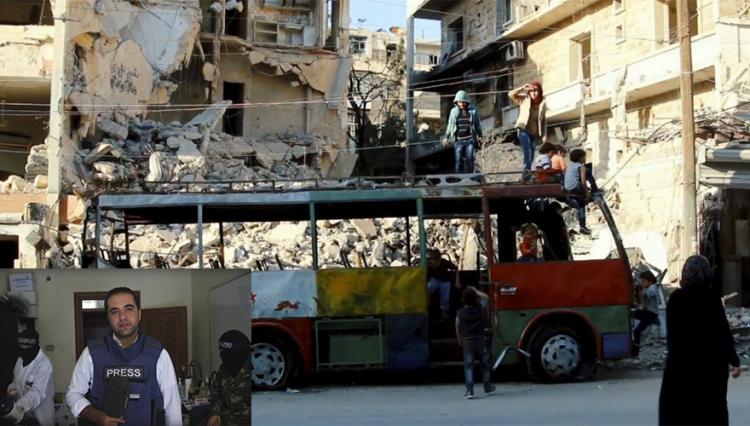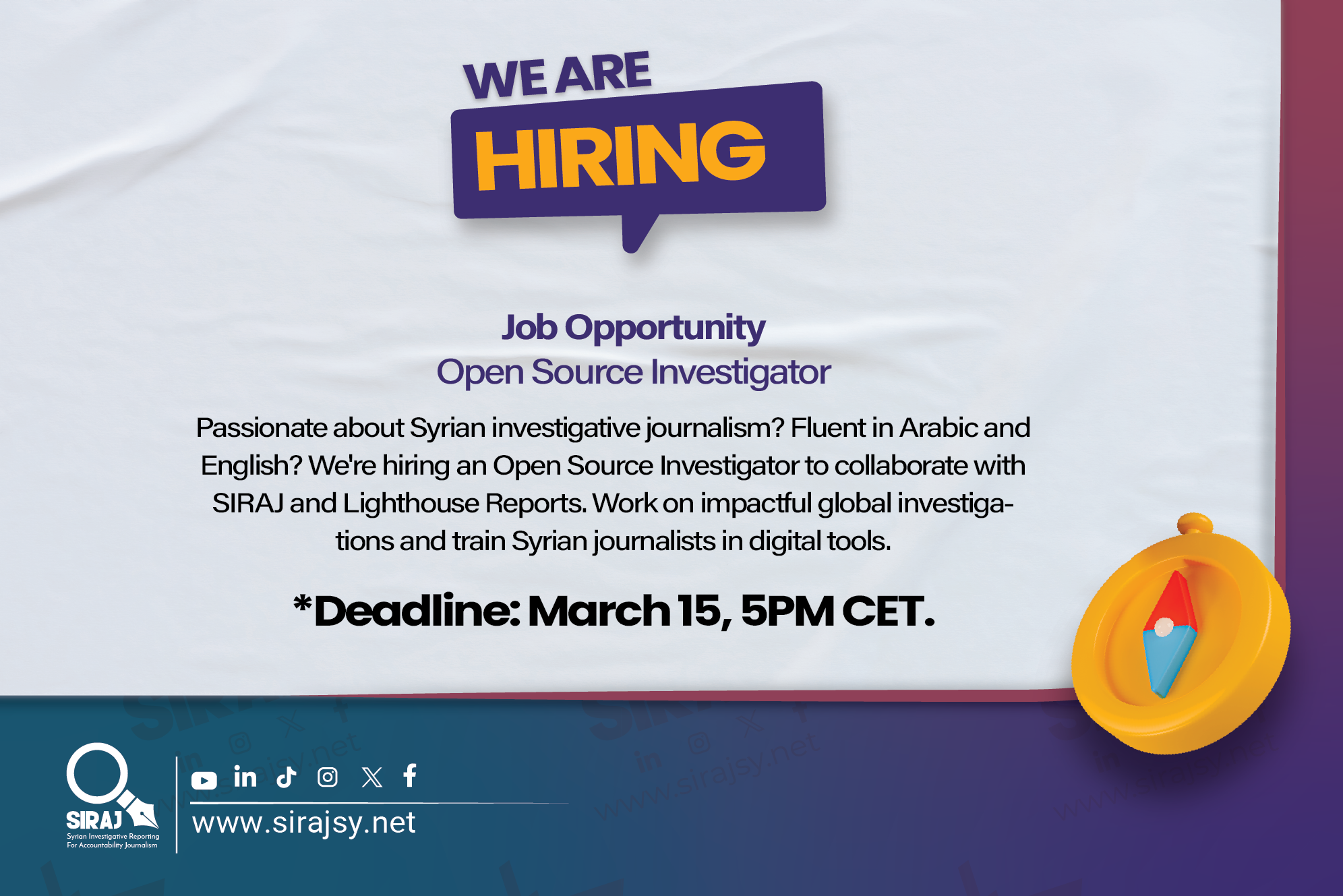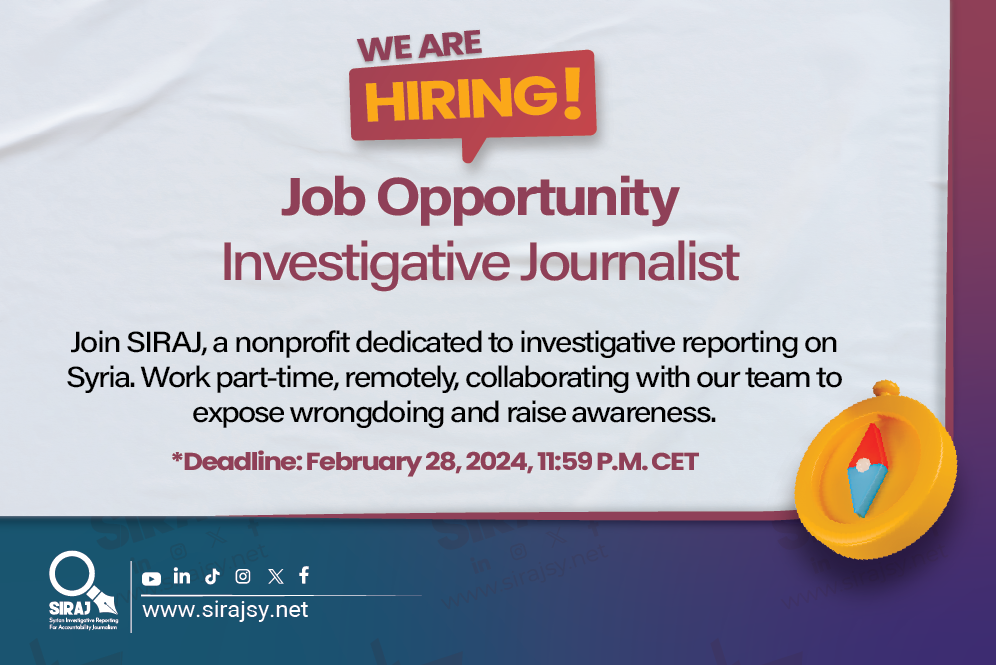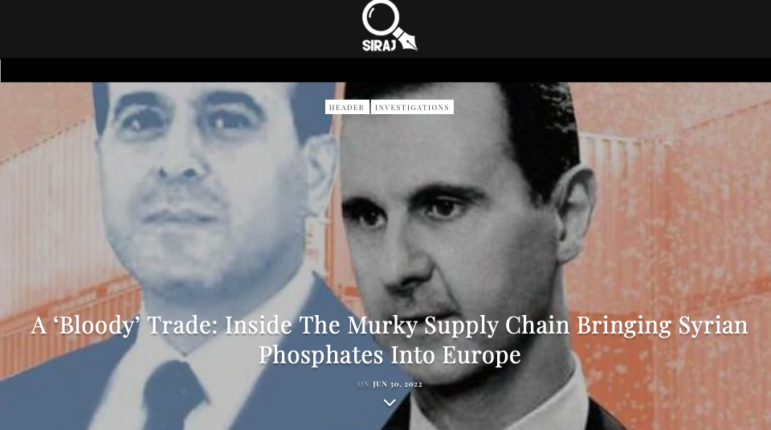

A witness and a voice for the Syrians
Still from the documentary film One Day in Aleppo, by Ali Al-Ibrahim. Bottom left: Ali Al-Ibrahim is a Syrian journalist, writer and documentary filmmaker.
– As a journalist, the most important task of my job is to be a voice for the Syrians who were deprived of their voice; the voice of those who have been abused, misused, tortured or killed, and the voice of those who aspire to freedom.
The world is a dangerous place for journalists. In 2018, Reporters Without Borders (RSF) reported 348 documented cases of journalists and media workers detained, 80 killed and 60 held hostage. On World Press Freedom Day we stand in solidarity with silenced journalists, and emphasise the vital work to support those who use their voice to fight for freedom and democratic values.
According to RSF, Syria remains as one of the most perilous and deadly countries for journalists in 2018. Journalists still make up the largest group of applicants for safe ICORN residencies.
We interviewed award-winning journalist and documentary filmmaker from Syria, Ali Al-Ibrahim, who has covered the civil war in Syria, from the peaceful protests in 2011 to the battles in El-Gouta, first hand.
He has documented and reported on the devastating destruction of his country and the war’s impact on civilians. Al Ibrahim has survived both Assad’s prisons and ISIS’ captivity. To escape death and continue to work, he left Syria in 2015 in a dangerous escape and arrived in 2016 as ICORN writer-in-residence in Jönköpings Län in Sweden. He has since worked tirelessly with reporting and film projects to bring to the world the devastating destruction of his home country and its people.
The world needs reporters to document what is going on in our country.
Interview with Ali Al-Ibrahim
-You arrived in your ICORN residency two years ago in Jönköping in Sweden and have been working tirelessly since day one. You have won many awards and been an important voice for bringing awareness internationally about the war and its impact on the Syrian people. Can you tell me which projects have meant the most to you and why?
I would like to start with thanking ICORN for granting me this two-year residency in Sweden, Jönköping. This has been, and still is, an important chance which has helped me to continue what I have started. It has also helped me to promote myself and my work. I am grateful to Region Jönköpings län, especially Märit Lundsten and Jörgen Lindvall for their relentless support from the very beginning of my stay. They motivated me so much, helped me and followed me up gradually. I would like also to thank all the staff at Kultur och Utveckling.
For me, the most important project is my film ONE DAY IN ALEPPO (2017), because it is a transparent and pure documentary about the harshness, the insane daily life when besieged by death, destruction and daily violence. This film has created an impact and conveys a realistic image of the brutal reality in the besieged cities in Syria. It documents existence in that period and focused on the Syrian sufferings by following characters – without any words. I did this intently, because as a journalist and a filmmaker, I wanted people to express themselves freely; by motion, facial expressions, and looking. I wanted them to practice the freedom they were deprived of during more than 40 years under the regime’s strict iron grip.
– As a journalist, the most important task of my job is to be a voice for the Syrians who were deprived from their voice, the voice of those who have been abused, misused, tortured or killed, and the voice of those who aspire to freedom.
– ONE DAY IN ALEPPO has won 14 international awards from international and Arab festivals and events. It was screened at more than 25 festivals around the world, and succeeded, I think, in conveying the Syrians’ suffering and spreading their message to the world; that they deserve a decent life and freedom; and that what is happening is merely a consequence of their rebel against enslavement and breaking the chains.
The other important project is my new collection of short stories titled SYRIEN LEVER OCH DÖR that will be published in Swedish. These stories were written in Sweden. They are true stories, I have witnessed many of them in Syria. The book will be issued in May and we will publish it online in Arabic, under the title Syria, cities of death and life. The stories go deep into the widespread devastated areas in these Syrian cities and focus on the exhausted people who never get sick of trying to catch up with life. It documents people’s destroyed houses and their rebellious wishes against death and destruction. It is not a crying about what was. It is full of real stories that will be passed on to the coming generation, so that they know what the Al-Assad regime has done to Syria and the Syrians.
-What do you believe is your most important task as a journalist, as a Syrian journalist? With residency in a safe country like Sweden, is the task still the same?
– As a journalist, the most important task of my job is to be a voice for the Syrians who were deprived from their voice, the voice of those who have been abused, misused, tortured or killed, and the voice of those who aspire to freedom.
I also think that one of my important tasks is to be a witness, to document the violations that have occurred in Syria, such as the Syrian regime’s chemical attack against Syrians; the long detentions and arrest situations; how the regime targeted civilians, recruited children and many other crimes. These tasks are among my priorities despite the fact that I live in a safe country like Sweden. However, this city of refuge has helped me to continue working and facilitate documentation with the help of technology – to track storytellers, make interviews, access source of information and stories of people.
-Working for human rights, freedom of expression and democracy, what is the biggest difference in working in the field in Syria and from in a safe residency, away from the war? Can your work have more or less same impact?
The Syrian Network for Human Rights (SNHR) documented the death of 689 journalists and media workers in Syria between 2011 and 2018. In addition, local legislative nongovernmental organizations documented the death of 450 journalists and media workers between 2011 and 2018, 29 of them died under torture, while others are still registered as unknown. RSF reports of 31 journalists held hostages and maintain Syria’s status as the world’s greatest holder of media hostages.
– Here in Sweden your work is fruitful, it has effect and helps, while there in Syria, we can only document and hope that one day, we can use it.
The shocking statistics about the dead, detained and unknown journalist in Syria is a clear answer to your question. I think the difference between being a journalist in Syria and in Sweden, is that here in Sweden people are safe and enjoys the freedom of expression and traveling everywhere in the country, getting the information they need. There are many other essential differences like; information here is given to all who seek it, while in Syria, information is forbidden or censored. No need also to mention that here in Sweden your work is fruitful, it has effect and helps, while there in Syria, we can only document and hope that one day, we can use it.
-When you came to Sweden, you had started a project to explore what has happened to the more than 10.000s of children who have disappeared after arriving in Europe. How is this project progressing and how are you working to document these disappearances?
As for this project, about the 10,000 who disappeared after arriving in Europe, we are still working, as a team, on documenting all cases which we find, investigating the reliability of information and documenting what happened to those cases. We have collected information, began ascertaining stories and cases we had got already. I think we will begin the production process soon.
There are many children refugees who couldn’t get hold of documents that prove they are Syrian citizens – or even that they exist, are alive or dead. Statistics show that up to 500,000 of 7 million Syrian refugees are without any certification.
-What are you working on now and what are your hopes and plans for the future?
My new project is a film titled (without identity). It is a long documentary, which exposes life of the ‘living ghosts’ in Syria – I mean those who were born during the war and survived it without certification to prove their existence; identity, personality, families, etc. There are many children refugees who couldn’t get hold of documents that prove they are Syrian citizens – or even that they exist, are alive or dead. Statistics show that up to 500,000 of 7 million Syrian refugees are without any certification.
You are registered when you are born, you are registered when you start school, when you marry and you are registered when you die. The film will follow different unregistered characters in these four stages of life. We have already for the film, a woman who died lately; two new couples; a little girl who lives in the orphanage and a new born baby of two refugee parents.
For the future, I have many projects: statistic investigations, new films from the Middle East, and all document a very important period in their life. I hope these films will help them to change this awful situation they live in now, hopefully it might lead to freedom.
I am a cofounder SIRAJ. SIRAJ is the first Syrian investigative journalism unit, founded in November 2016 by a group of independent Syrian journalists with great experience in printed, broadcasted and televised investigations. SIRAJ is not connected to any political party or side. It’s objective is to strengthen investigative journalism in Syria and turn it into a tool of censorship and accountability, for the society’s benefit.
We currently work with about 25 journalists. We organize workshops about investigative journalism aimed for Syrian journalists to improve their skills.
We always publish our investigations in Arabic and international newspapers, journals, and websites. In addition, we have trained more than 30 journalists (men and women) on the basics of investigative journalism. Last year, we started a new training programme aimed for aspiring journalists.
Our training programmes are meant to qualify journalists to produce investigations which can be a tool for accounting and documenting abuses.
Al Ibrahim’s new book, Syrien Lever och Dör (Syria, cities of death and life) will be launched in Sweden on 7 May and gives voice to thousands of diseased Syrians.
#WorldPressFreedomDay
World Press Freedom Day 2019: Media for Democracy. Journalism and elections in times of disinformation.
Every year, 3 May is a date which celebrates the fundamental principles of press freedom, to evaluate press freedom around the world, to defend the media from attacks on their independence and to pay tribute to journalists who have lost their lives in the exercise of their profession. World Press Freedom Day was proclaimed by the UN General Assembly in 1993 following a Recommendation adopted at the twenty-sixth session of UNESCO’s General Conference in 1991. This in turn was a response to a call by African journalists who in 1991 produced the landmark Windhoek Declaration(link is external) on media pluralism and independence.
ONE DAY IN ALEPPO
One Day in Aleppo. Documentary film by Ali Al Ibrahim, a rough and poetic portrait of the daily survival of the civilians in Aleppo.
The camera keeps on filming as the bombs continue to fall and the inhabitants of Aleppo continue to die, day after day. Without words, the lens focuses in—sometimes from above—on the smoldering ruins and the people struggling to survive among them. When Russia cuts off the supply of food and medicine, there is every reason to despair. This small, loving mosaic of images shows the resilience and resistance of the Syrians, building tiny beacons of hope and keeping up their courage by rolling up their sleeves and getting on with life. One man feeds the stray cats, another gathers wood, a third bakes bread it proves possible to make petrol using plastic debris from the smashed buildings. A group of children use paint to brighten up the dusty walls and wrecked cars of the city surrounded by the Syrian army.
These are all very ordinary, everyday activities that could almost be reassuring, were it not for the awful background they’re taking place against.
The film was completed in a year and the shooting was made in Aleppo while under siege, from 2016 to beginning of 2017. During this period, 3 characters of the film died.
The film is directed by Ali Alibrahim and produced by Feras Fayyad (director of ‘Last Men in Aleppo’ produced Oscar nomination for 2018) in collaboration with Aleppo Media Center, co-producer Kareem Abeed and the support of Region Jönköpings län in Sweden and the Swedish Film Institute.
IDFA 2017 | Trailer | One Day In Aleppo
The International Cities of Refuge Network (ICORN) is an independent organisation of cities and regions offering shelter to writers and artists at risk, advancing freedom of expression, defending democratic values and promoting international solidarity.



